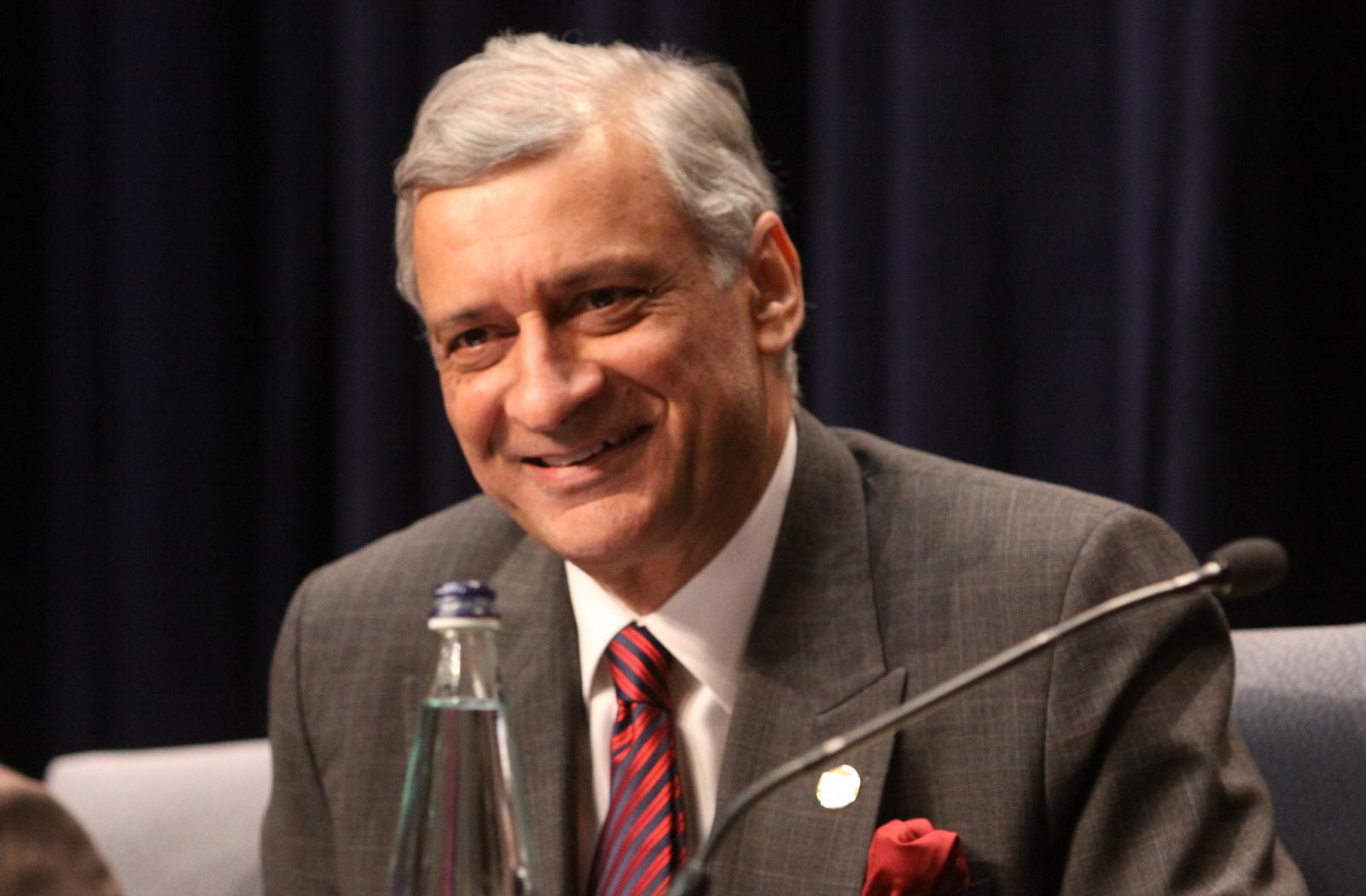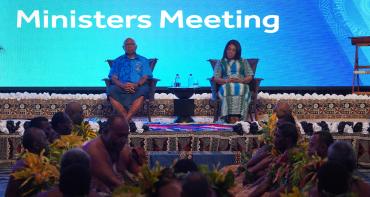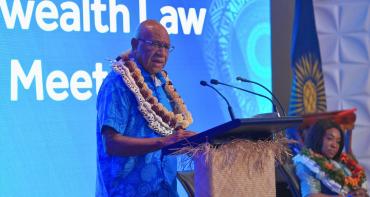Commonwealth Secretary-General Kamalesh Sharma addresses the first-ever Commonwealth ICT Ministerial Forum.

Honourable Ministers, distinguished delegates, Commonwealth friends.
It is indeed a pleasure to join you for the opening of this inaugural Commonwealth ICT Ministerial Forum. It seems fitting that this gathering should be taking place here in Marlborough House, the headquarters of the Commonwealth - and the place from where, over the years, so many imaginative and ground-breaking ideas and initiatives have been carried forward from concept to implementation.
We thank the Commonwealth Telecommunications Organisation and Professor Tim Unwin for convening ICT ministers from across the Commonwealth to discuss issues of collective and shared concern. The support offered by our own Secretariat team reflects our strong commitment to working in partnership with Commonwealth and other international organisations. This is very much in line with the collaborative and partnership method of working set out in our new Strategic Plan for the Secretariat.
Growing Importance of ICTs
The context within which the Commonwealth works is as a values-based organisation. Our member states are committed to a continual raising of the expectations they have of themselves and each other in moving towards shared goals of democracy, development, and respect for diversity. ICT provides transformative tools that create game-changing digital pathways for inclusive social progress, equitable economic growth, participatory democracy, and responsive governance.
The explosive growth of the internet has revolutionised global access to knowledge, networks, business opportunities, expanding markets, transcending national boundaries. Widespread access to social media brings new immediacy to politics and governance, with elevated expectations of transparency and accountability.
Ways in which public services can be delivered are changing beyond recognition. This includes instant and remote access to diagnostic tools for health, and educational opportunities not limited by location or infrastructure. We at the Commonwealth are developing hubs for health and education, to be known respectively as ‘Common Health’ and ‘Common Knowledge’. These have the potential to become among the largest interactive professional networks in the world, and offer massive opportunities for collaboration, best practices, information, and sharing of resources in secure workspaces designed to answer the needs of specialist practitioners and administrators alike.
However, new technologies also spin off fresh challenges. The ICT-savvy ‘uncivil society’ is a growing threat, globally affecting government security, commerce and personal privacy. Vulnerability to bullying and untoward exploitation is heightened – particularly for children.
Commonwealth tradition of ministerial co-operation
By exchanging experience and insights on a vast variety of subjects, whether an opportunity or a threat, and many other ICT-related issues, we continue a rich Commonwealth tradition. It is one of offering mutual support and best experience and practice and seeking both to draw on, and to share with others, the wealth of knowledge and wisdom gained, and the benefits of new thinking. This is vital if we are to harness rapidly and to optimal effect the proliferation of new technologies available.
This forum brings together a rich pool of collective knowledge from across the Commonwealth. We can expect to discover new areas of common interest, and to find fresh ideas and opportunities for exploiting the benefits of technology. We can also anticipate the development of enduring networks and relationships for fruitful collaboration.
Many of our members, particularly small states, have relatively limited resources and capacity. Our Commonwealth approach is to explore how we can share applications and develop regional approaches that bring economies of scale, avoid duplication, and accelerate implementation of technology solutions. In other words – we should build once and use many times.
This naturally extends to finding ways in which ICT can be used to best effect in the Commonwealth context as an essential vehicle for achieving wider strategic gains. Our electronic and mobile governance programme is designed to facilitate transformation in core areas of public administration, from public financial management to anti-corruption, including the improvement of service delivery for citizens. These benefits are amplified in small states. We are pleased to be able to assist eGovernance programs in member states such as Seychelles, Sierra Leone, Swaziland, Tonga, Tuvalu and Vanuatu, and are now developing a regional approach to eGovernance that will build on, and leverage the experience gained.
Commonwealth Connects Programme
Since 2000, following a decision by Commonwealth Heads of Government, the Commonwealth Secretariat has promoted exchanges of information and collaboration between various Commonwealth agencies in areas that promote ICTs for development in member countries and that contribute towards strengthening the Commonwealth’s values and goals. In 2005, these efforts were given further impetus with the establishment of a ‘Commonwealth Connects’ Special Fund and Steering Committee representing key Commonwealth agencies active in the ICT sphere as well as several member governments. The Commonwealth Connects Special Fund has now been exhausted and the Steering Committee decided at its last meeting, in January 2014, to sunset itself and its work.
The work of the Steering Committee in drawing together ministers and officials from member states to pool and disseminate ideas and experience, and to identify needs and resources, can now be carried forward in a broader and more open-ended way by this Forum. Strengthening partnerships with Commonwealth organisations and other collaborative projects is the way forward.
CHOGM mandates
An example of this is the Commonwealth Plan for Broadband Inclusion. At the Commonwealth Heads of Government Meeting in November our leaders recognised the importance of enhanced international co-operation to support implementation of national policies and strategies to promote universal digital access. They agreed to significant outcomes relating to ICT and welcomed in particular work being undertaken on the Plan for Broadband Inclusion.
It is a very practical example of collaboration between the Commonwealth Secretariat, the Commonwealth Telecommunications Organisation, and the International Telecommunication Union. Working as a multi-stakeholder partnership our three organisations will support the development of national broadband policies and strategies in those Commonwealth countries where they are yet to be developed. This will help bridge the broadband divide and ensure accessible and affordable access to broadband and to all the ICT-based resources being developed in the Commonwealth and elsewhere.
Heads recognised this as laying the foundations for contemporary digital economies so that all Commonwealth citizens can benefit from the opportunities that broadband access affords for economic growth and collective wellbeing in the interconnected global economy. This will include being able to take advantage of the potential of our own Commonwealth Connects web platform which, through its dedicated workspaces for ministers, officials and other communities of interest, will increasingly provide the means for advancing Commonwealth interactive work and relationships, whether at the level of government, institutions or communities of practice. The way ‘Connects’ is developing illustrates that this is an idea whose time has come.
Heads of Government reaffirmed the importance of addressing the increasing complexities of cybercrime. These are a major threat to socio-economic growth, peace and stability. They encouraged collaboration between member states and relevant international organisations and agencies, to develop appropriate programmes of technical assistance, in order to enhance capacity in resource-constrained settings.
Heads acknowledged the Commonwealth Cybercrime Initiative and the endorsement of its methodology by senior officials of Commonwealth law ministries in September. The Secretariat has made good progress in bringing together - to fight cybercrime under the Commonwealth umbrella - a consortium of over 30 organisations, including the Commonwealth Telecommunications Organisation. The security of the internet and technology platforms is critical, in particular for confidentiality in the delivery of eGovernance services, and for integrity in trade and commerce. There are already specific programs for Africa and the Caribbean, and a request has now been received from the Pacific.
Conclusion
Ministers, delegates, distinguished guests and colleagues, we welcome your participation. It is in forums such as this that priorities for the future are identified, and best-fit solutions found. We look forward to working closely with you to find creative ways of sharing the developments and dividends of ICT for the benefit of all our Commonwealth member states and their citizens – to create the digital bridge we need to span the development divide.



